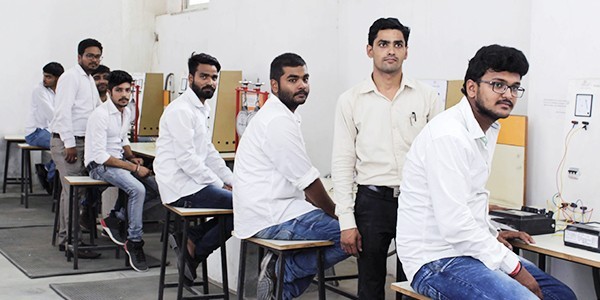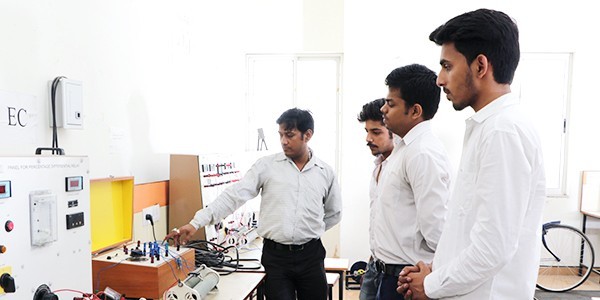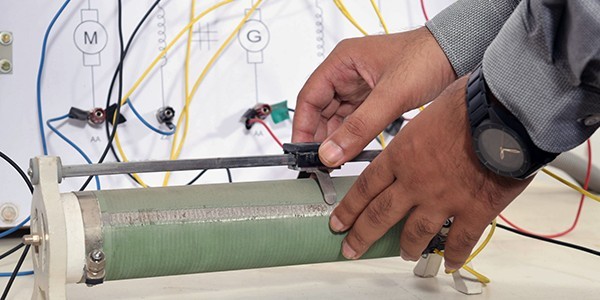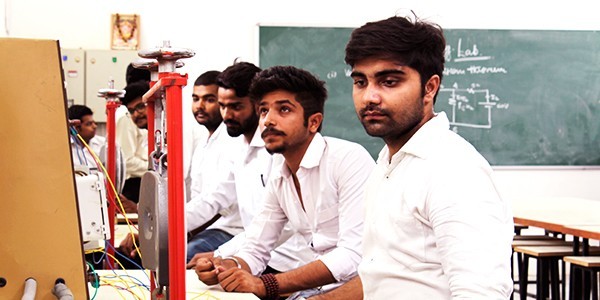B. Tech – Electrical Engineering
Educational Objectives
Electrical Engineering (EE) is the study of principles majorly related to electricity and associated devices. Being one of the core disciplines of engineering, EE is always a sought after stream at the top B.Tech College in Lucknow like BBDU.
Just like the spinal cord of a human body, a structure and a mechanism which shapes the working of a human body, electricity or electrical power is the core of all machines and technology, from the computer chips and processors to the big and small mechanical machines, from the sleek mobile phones to the huge airplanes.
Clearly, with advancements in technology on one hand, and rising environmental crisis & lack of resources on the other, there is a call for EE engineers who can make a difference now. To bring such engineers into light, BBDU:
- Gives the best possible set of faculty to all the students
- Provides labs with state-of-the-art technology
- Adds practical trainings to the curriculum for real-time learning
- Facilitates access to unlimited reading material, including international research papers and journals
- Provides facilities for recreation and stress-busting
Opportunities For Electrical Engineers
Engineers from BBDU, the Electrical Engineering College in Lucknow, have a whole variety of opportunities and options available as soon as they complete their B.Tech courses. From IT companies (dealing with electrical clients and companies) to Automobile companies (the whole electrical part of automobiles, its development, manufacturing, maintenance) to the core electrical companies and electronics companies (system engineer, engineering trainee, analytics etc.) etc., EE engineers can be placed anywhere depending on the requirement and availability.
Moreover, while these are just the options available to a EE engineer in terms of job, there are more options when such a candidate looks out for scope in research and further study.
Some posts and opportunities available to EE engineers are:
- Analysis Engineer
- Development Engineer
- Testing Engineer
- Design Engineer
- Research Scientist
- Logistics Engineer
- Engineering Graduate Trainee
Program Outcomes
- Engineering Knowledge: Apply the knowledge of mathematics, science, engineering fundamentals and an engineering specialization to the solution of complex engineering problems.
- Problem Analysis: Identify, formulate, review literature and analyze complex engineering problems reaching substantiated conclusions using first principles of mathematics, natural science and engineering sciences.
- Design / Development of Solutions: Design solutions for complex engineering problems and design system components or processes that meet the specified needs with appropriate consideration for the public health and safety and the cultural, societal and environmental considerations.
- Conduct Investigations of Complex problems: Use research based knowledge and research methods including design of experiments, analysis and interpretation of data, and synthesis of the information to provide valid conclusions.
- Modern Tool Usage: Create, Select, and apply appropriate techniques, resources and modern engineering and IT tools including prediction and modeling to complex engineering activities with an understanding of the limitations.
- The Engineer and Society: Apply reasoning informed by the contextual knowledge to assess societal, health, safety, legal and cultural issues and the consequent responsibilities relevant to the professional engineering practice.
- Environment and Sustainability: Understand the impact of the professional engineering solutions in societal and environmental context and demonstrate the knowledge of, and need for sustainable development.
- Ethics: Apply ethical principles and commit to professional ethics and responsibilities and norms of the engineering practice.
- Individual and Team Work: Function effectively as an individual and as a member or leader in diverse teams and in multidisciplinary settings.
- Communication: Communicate effectively with the engineering community and with society at large. Be able to comprehend and write effective reports documentation. Make effective presentations, and give and receive clear instructions.
- Project management and finance: Demonstrate knowledge and understanding of engineering and management principles and apply these to one’s own work, as a member and leader in a team. Manage projects in multidisciplinary environments.
- Life-long learning: Recognize the need for, and have the preparation and ability to engage in independent and life-long learning in the broadest context of technological change.
Program Specific Outcomes
- Ability to apply fundamentals of Technology for Engineering Solutions in accordance with industrial demand using the domains of applied science, algorithms, electrical power, power electronic components, transient behavior, economic operation, Reactive power dispatch, optimal power flow, Security, Unit commitment, State estimation and Modeling & Simulation analytics.
- Ability to employ modern computer languages with focus on open platforms to develop innovative solutions in the field of Electrical Engineering (electrical power, network, power electronic components, transient behavior, economic operation, Security and Contingency) with professional behavior and ethics.
Syllabus
Engineering Courses
Labs
- Basic Electrical Lab
- Control System Lab
- Electric Drives Lab
- EMEC-I Lab
- EMEC-II Lab
- EMMI Lab
- Network Lab
- Modelling Simulation Lab
- Power Electronics Lab
- Power System Lab
- Artificial Intelligence Lab
- Power System Protection Lab














